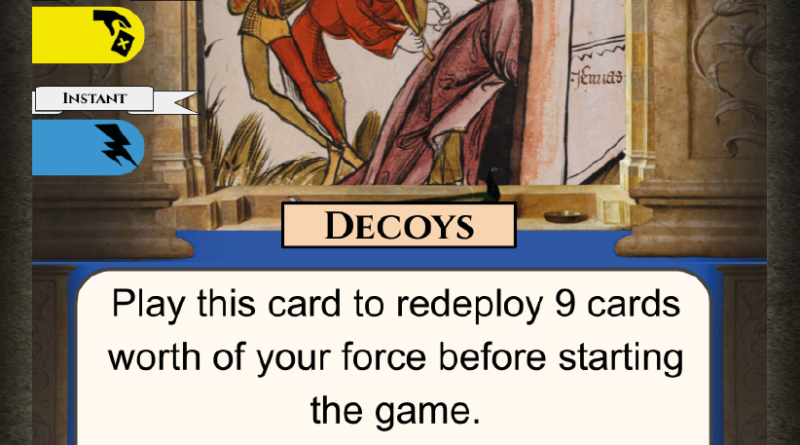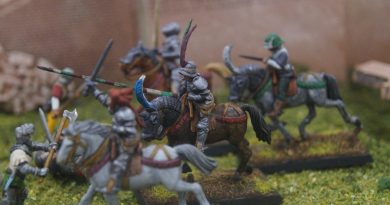Why Deck-based Army Building?
Force of Virtue is different to most wargames in that it doesn’t use a point system for players to select their warband for the game, instead players select an equal number of cards from decks they have chosen.
A few people have asked why we chose to go this route rather than just army books?
Variety is the Spice of Life
Army Building is generally speaking meant for ensuring both players have balanced chances of winning. We take maybe a slightly novel view on things. Rather than thinking of the forces on either side being balanced, we want the factors on both sides to be balanced. Let us put on our “15th century mercenary” hat and assume that I have the choice to not engage my opponent, slip off and wait for a better moment. If I choose to engage it must be because I think the factors are in my favour. What those factors are might be multi-faceted. They will of course include my troops, their armament and their training, but it also might include the weather, my objective, my ability to achieve it, my men’s morale my opponent’s morale and any 3rd parties that might complicate things.
In Force of Virtue cards are divided into 4 basic types that can be taken to include in your list
- Logistics – Troops, Equipment, Officers
- Honour Cards – Training and talents troops and officers might have
- Strategic – Advantages in deployment or situation
- Intrigue – Special intelligence or underhanded tricks
Could we have done this with options off a list with point costs yes but…
“Bounded” Complexity
One of the main reasons we went with cards is it allows to create a relatively simple set of base mechanics that are manipulated and expanded on by cards. Anything that expands on the basic core rules comes directly via the cards. The complexity is “bounded” or controlled by the number of cards brought by the players. This means players only need to worry about rules that the players have opted into via the cards. The rules are also presented on the cards making reference faster. If the rules were in a book that needed to be referred to then the players would constantly be looking through a massive rulebook. This way the rulebook effectively shrinks and grows to the complexity players are wanting to engage in at that point in time.
This allows us to start building in some quite elaborate elements without overloading the players. Things like weather effects, special abilities, scenario special rules etc. are all easy to include and control via the cards.
Asymmetrical Play
Even a cursory examination of history or even narrative literature will show that situations are rarely symmetrical or clear-cut. Most Generally, if games introduce asymmetry into army building it’s by uneven numbers or troop specialties. Small elite force vs big unskilled force. However that’s not really even scratching the surface. What about the possibility of a lot of unmotivated elite troops caught unawares by a few unskilled motivated troops? Weather and terrain advantages? Command and control situations that hamper a force? Are there extenuating factors that prevent a force from bringing it’s full strength to bare? These are things we desperately wanted to make possible in Force of Virtue without resorting to scenarios.
Cards, because they help us bound the complexity and manipulate and interact with other cards organically, allow us to bring in many of these asymmetric factors. If you want to run a single marksman using the situation to his advantage to take out a small patrol unawares that is something you can definitely do! Equally since morale is not a stable thing you can easily model variances of morale of troops, weather etc.
The Price of Relevancy
Integrating these factors into the army building achieves a few really important things over set scenarios. Firstly it allows for greater modularity and variety. Secondly, it allows for elements of surprise and fog of war, an ambush scenario tells you already what will be happening. Thirdly, they are costed, scenarios often doll out unwitting advantages without forcing players to account for the cost. Of course a hill or rain doesn’t cost a general something, but it is a factor that should be considered. This brings us to the last thing that integrating these things into army building ensures, relevance. If you create a scenario with mud effecting heavy troops, what if there are no heavy troops? What about the objective of killing a magic user if the enemy has no magic users? Possibly the worse sin “the situational rule tax” on units, the extra expensive unit that slays demons better, but stays expensive even when the enemy are not demons. Again, realistically the cost of training the unit might not be less, but that is no longer a factor in the commanders reasoning. Just like one of your officers may be an absolutely stunning crochet artist in his spare time, but that doesn’t mean you as a player should have to pay a tax for it in game.
Integrated Army-Building Restrictions
Force of Virtue seemingly a minimal amount of army building restrictions. Players can select cards from up to three decks, as long as a maximum of two of the decks are nation decks and both players can draw from a scenario deck. For a game a maximum of 50% of cards can be logistic cards, the rest must be other types. There are no other percentage restrictions on what units you can and can’t bring.
Despite this however there is actually a fair amount of structure built in. By providing decks we can limit the number of cards included in a given deck, both for thematic and mechanical reasons. Certain factions have greater access to certain weapons or troop types than other factions based on their historical reputation. You can choose to combine 2 nation decks but this will mean you are forfeiting on doubling down on the first deck’s core strengths. You also can’t take of each nation decks favourite cards as you want since these tend to be lower in number.
Ease of Campaign Play
Simply put, having cards that you can use to track your campaign assets is a lot easier than tracking them on a sheet and allow you to track more complex things like situational advantages like having taken a bridge, or kidnapping someone. Every time you win an Victory Point in game, just add a card to your warband.
Still, Why no points?
Many games have cards that cost points, why not do that? To some degree this goes back to factor based balance and bounded complexity. If I have 100 points, I could easily spend it on a bunch of small upgrades that each add a factor into the game and before I know it end up with 30-40 factors, spend it on a few things that end up being only a few factors, or maybe even a couple really expensive items with a whole pile of nested factors. Keeping it to cards forces us to try and be disciplined about trying to make sure each card earns a right to be in a deck, even if it’s use is fairly conditional, but of course proportionally more powerful if those conditions are met. The main reason however is it simplifies the speed and math involved in building a force. Managing numbers under 30 are a lot easier for people than the hundreds. We want building armies to be fun and quick, not an accounting exercise.
Options
In the core rules the cards themselves are primarily used for army building, but having them as cards opens up so many possibilities. The most obvious one is drafting scenario cards before the game, but you can also create impromptu random tables. Randomised rewards for objectives. Game modes where both players are constantly drawing and discarding more cards that they can implement in game. Tournament formats with randomised draw elements. Cards allow lots of optional ways to manipulate the game and play different formats.




